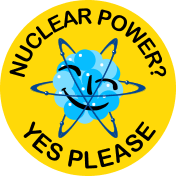The fallacy of ‘proliferation’
Atomic power does not lead to atomic weapons. By an evil coincidence, the discovery of uranium fission occurred simultaneously with the outbreak of the Second World War, and atomic energy was first put to use for the purpose of destruction. Even the first uses of controlled fission to produce power were in the service of military ends. These entirely contingent historical facts have led to a false impression that there is no point where the warlike uses of the atom leave off, and the peaceful ones begin — even though a reasonable evaluation would show that the latter are greater by far.
While it is true that some of the specialized engineering knowledge required for creating atomic power plants is transferable to building atomic explosives, this is not what happens in practice. The United States exploded the first of all atomic bombs in 1945, and generated the first watt of electricity from a nuclear reactor in 1951 ; its first civilian atomic power plant came on line in 1957. The Soviet Union detonated its first bomb in 1949, first generated power from atomic energy in 1955, and started its first practical atomic power plant (in the military closed city of Tomsk-7) in 1958. The first Chinese atomic bomb appeared in 1964, with the first power reactor coming only in 1991.
Both Britain and France developed their earliest power reactors from prototypes which produced plutonium for weapons, but found this approach not worth pursuing. The State of Israel is well-known to possess atomic weapons, but has never had an atomic power plant (leaving it totally dependent on imported coal and gas, a strange choice for a country with hostile neighbours). In South Africa, the weapons program interfered with civilian development ; a bomb was built in 1982, while the power plant opened in 1984 was French-built.
By way of contrast, both Canada and Japan have large nuclear energy and engineering capabilities ; until recently, the same could be said of Germany. Any of these countries could have, any time in the past forty years at least, turned its expertise and facilities over to the creation of weapons, and probably built a bomb within months. But none did. Sweden, faced with the Soviet Union a stone’s throw away, began with a program to build bombs and power plants, but ultimately dropped the first part. We may, perhaps, generalize, and state that what is needed in international politics is to encourage just such responsible use of atomic energy, rather than to treat aspirants as criminals in waiting.
The threat of diversion is mostly illusory. One encounters the assertion that the more widespread use of atomic energy will mean opportunities for criminals or irresponsible governments to abstract material from the fuel cycle for use in weapons. A little consideration, however, shows just how unlikely this is. Quite independent of national or international regulatory controls on radioactive and fissile materials, nuclear fuel is valuable, and the most basic economic considerations dictate that every gram be accounted for.
Each fission releases about 200 million electron-volts of energy. A kilogram of fissile material, then, can yield some 82 trillion joules, or 22.8 million kilowatt-hours. If used with an overall efficiency as low as ten per cent, to generate electricity sold as cheaply as one cent per kilowatt-hour, this is equivalent to almost twenty-three thousand dollars. By comparison, the value of gold is about forty thousand dollars per kilogram at recently prevailing prices.
The fact that fissile material is radioactive makes it challenging to handle, more so when it is mingled with fission and decay products. The same property also makes it easier to trace and find, compared for example with chemical toxins. And the need for specialized facilities would not only discourage potential thieves, but make them easier to find.
Fundamentally, however, the principal danger comes not from a few crude nuclear explosives in the hands of gangsters or dictators, but from the tens of thousands of bombs — mostly tens or hundreds of times as powerful as what might be built by ‘amateurs’ — which already exist. It would be against all human experience for those weapons to go unused forever ; by inference, every day that they continue to exist is one day closer to atomic violence.
The world’s greatest force for disarmament
Atomic power plants have consumed twenty thousand atomic bombs in the past twenty years. By providing an alternative use for fissile material, nuclear energy opens a unique path for the reduction of nuclear armaments. Simply dismantling bombs leaves open the possibility of reassembling them, but incorporating their fissile material into the fuel supply makes it much more difficult to go in the opposite direction.
In the twenty years following 1993, much of the low-enriched uranium used in American power reactors was obtained, not from isotopic separation of newly-mined uranium as in the past, but by blending natural or depleted uranium with highly-enriched uranium from decommissioned Soviet nuclear weapons. Under an arrangement known colloquially as “Megatons to Megawatts” (which has since expired, and shows no signs of being renewed), some 14 446 tonnes of nuclear fuel was obtained by the United States, at a cost of seventeen billion dollars.
If we suppose that this fuel has been used with an average ‘burn-up’ of forty megawatt-days (of heat) per kilogram and an average thermal efficiency (heat in to nett electricity out) of thirty per cent, reasonable figures for the present state of the art, the energy delivered amounts to 4.16 trillion kilowatt-hours. At an average price of five cents per kilowatt-hour, on the low side of present retail electricity charges, that amounts to 208 billion dollars — more than twelve times the price paid for the fuel. If such handsome profits are to be made by destroying bombs, who would bother to create them?
One nuclear explosion clears away all obstacles
Building an atomic bomb is not a crime of opportunity. The greatest obstacle in constructing a nuclear explosive is obtaining a sufficient quantity of high-grade fissile material. The converse, however, is not true : the simple possession of that requisite, however, does not automatically lead to the construction of an explosive. And yet this is the logic behind the Nuclear Non-Proliferation Treaty, the proposed Fissile Material Cut-Off Treaty, and similar measures proposed by devotees of ‘arms control’.
If nuclear technology and nuclear materials are restricted, they imagine, then nuclear weapons will not be built — and never mind the loss of the benefits that nuclear energy can provide (which they tend to depreciate). What they fail to recognize is that the construction of an atomic bomb, not to speak of an arsenal of them, is a deliberate choice which will be made for definite reasons. Nuclear armament can only be eliminated by eliminating the advantages its possession brings.
The Nuclear Non-Proliferation Treaty has been a failure. It has done very little to stop irresponsible states such as Pakistan and North Korea from obtaining atomic weapons, and its provisions for disarmament among the recognized Nuclear Weapons States have proven a dead letter. The cynic might be well justified in supposing that they were never meant sincerely, being merely a sop to placate the other signatories.
It may not be too strong to say that, in practice, this pact has been used by wealthier countries to impede the economic development of the less wealthy. A climate of paranoia about the peaceful uses of atomic energy has been fostered by a treaty nominally supposed to promote such uses, and prospects such as atomic-powered merchant fleets have only grown more remote. Innovation in atomic energy technology has also been obstructed, ‘locking in’ the use of light-water reactors and once-through fuel cycles, clearly the wrong way to go about things.
Once a country demonstrates that it can create an atomic bomb, the barriers placed in the way of its development of peaceful atomic energy, allegedly lest that development conceal military ambitions, tend to fall. After all, you cannot stop someone from obtaining something he already has — the best you can do is offer him something he might want more in exchange. And, now that the promises made to Ukraine in exchange for giving up its ex-Soviet nuclear arsenal have proven worthless, countries which succeed in building atomic bombs are not likely to renounce them, certainly not without substantial compensation. In other words, one of the strongest incentives to the development of atomic weapons is now the very treaty regime which purports to stop exactly that.
The case of Iran is illustrative. Certainly the government of the Islamic Republic leaves a great deal to be desired, but the isolation to which it is subjected (much greater than many far more odious states) only tends to make things worse. Iran, moreover, is the only country to have had ‘weapons of mass destruction’ used against it in warfare since the end of the Second World War — chemical weapons supplied to Saddam Hussein’s Iraq by the United States! So American claims that Iran intends to build atomic weapons, and demands to abandon that intent, seem more than a little ingenuous.
Worse still, commentators tell us that Iran has no ‘need’ for atomic energy, because it has plenty of natural gas, and thus its atomic aspirations must be military. This is patently absurd. Firstly, a major part of Iranian export revenue comes from gas sales, and increasing those by meeting domestic demand with some substitute is clearly advantageous. Secondly, the country sits atop rich deposits of uranium ; in a semi-industrialized economy where energy is already a dominant factor, not to develop this resource would be the strange choice.
It may well be that the leaders of the Islamic Republic intend to build atomic weapons, as a secondary or even primary aim of their nuclear development program. But denouncing them on the international stage for their evil intentions, and demanding that they forswear atomic energy, or at the very least submit to limits on the technology to be employed, and to foreign interference at every step, is not likely to convince them to abandon any such intentions. To the contrary, it could only strengthen their resolve, because it is clear that once you have The Bomb, you are home free.

